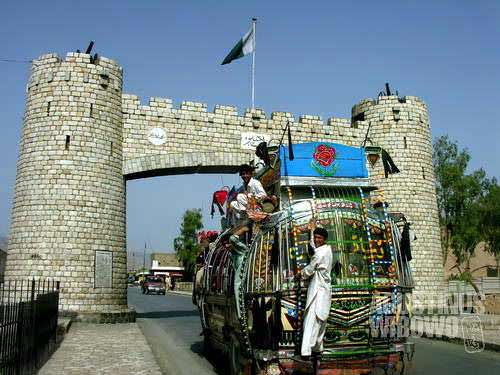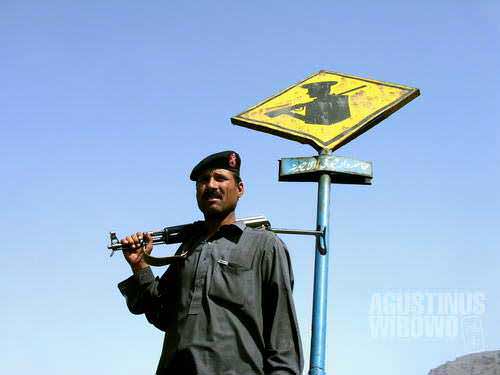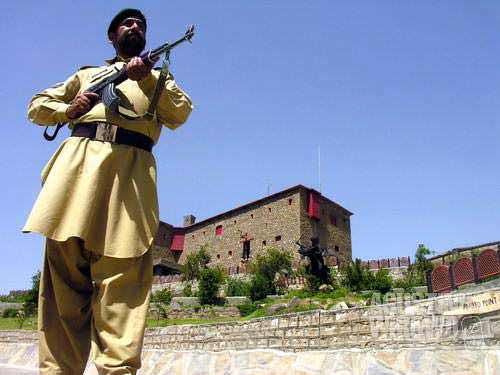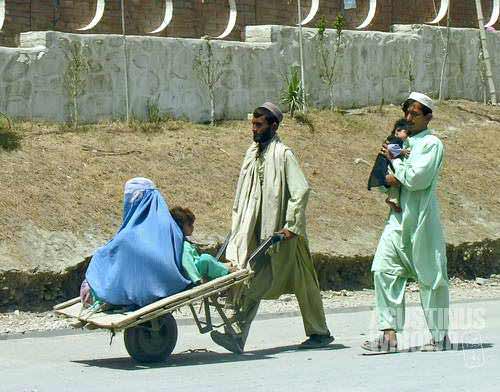Kabul – The Long Way to Afghanistan
The agencies of NWFP province are notorious of being troublesome. Waziristan is always on the top of ‘the place you likely want to visit’ among Pakistanis, and completely closed to foreigners. Not only once I read news about mission of Pakistani armies there in Waziristan, about terrorists (probably included mis-hit civilians) being killed, and about propaganda against foreigners who were accused by the government of being problems in this area. The ‘foreigners’ is a very wide term, ranging from Afghanis, Tunisians, Americans, or maybe Indonesians, Chinese, Japanese… As usual, I didn’t get the answers of all of my questions from the newspapers I was reading that day. And Waziristan (South and North)were only two among several hot points in that area.
Darra Adam Khel, later I found that it had been also included in the list of tribal areas, is famous for the gun making and hashish/cheras trading. I visited this village previously with my Malaysian friend, and we were completely unaware about the status. The khassadar (tribal police) tried to extort us money, but refused to pay, and still managed to visit some kalashnikov factories and even took several snaps in the village where the sounds of firing can be heard every other second, and where young boys play with bullets.
Pakistan is aware about the current situation, and closes all tribal areas to foreigners. Permit is needed to visit any of them, and not always granted especially for Waziristan. Exception might be for Khyber agency, of which permit can be easily obtained from the Ministry of Interior or Political Agent in few minutes. Khyber Agency had been very famous among travellers, either those who just merely want to enjoy the ‘romance’ of this historical war and trade route, or those who want to cross to Afghanistan through the famous Torkham border after the Khyber Pass. I was the later.
The procedure for foreigners to pass through is, after taking the permit, they should arrange their own transport and take a khassadar (tribal police) who will guard them up till the border. For me the biggest problem is the transport, which is more likely to be taxi, and very costly to cover that 60 km of distance from Peshawar (the taxi had to come back to Peshawar so the real distance they want to charge is 120 km). I was hanging around the town to find a good deal or someone to share the taxi price with.
I came to this travel guide. He had a title of Prince, which I didnt know whether he was real tribal prince. My friend recommended him to me, as she got free ride to the Torkham (maybe because she was a female traveller). His words were too high that it was very difficult for us to trust him, but as he gave such big help to my Malaysian friend, so I met him again. He promised me to try his best to get good deal for me, but then until the last day, there were no other travellers going to Afghanistan whom I can share the cost with. So it comes to me to pay 900 Rs for the car and 100 Rs for the tip to the khassadar. I said that I had money problems and he offered me to sleep in his house (it was midnight) and he said he even might give me money. He also made same signals with his eyes. Suddenly I stopped bargaining and prefered to pay that 1000 Rs.
This is not my first trip passing the Khyber Pass, in fact this is my third time. It was not as special and romantic as before. But now I notice that there were more tribal men with Kalashnikov walking along the street. The khassadar and taxi driver was quite cooperative, and they kept offering me to take pictures of the life along the main road to Afghanistan. Somehow the 1000 Rs worth it. But I know as this area is already very commonly visited with tourists, they know exactly what foreigners want to see and want to hear. Sometimes the taxi driver said, “many British people like to stop here and take photo of this fort,” or at other times, “many Japanese like to shoot AK here,” etc etc.
The colour of the road along the Khyber Pass was almost completely brown, with some green of the trees. But the house colour is completely brown. There is no culture of painting the houses. Children was just finishing their class and rushed home. The uniform is dark black. The education here, despite they have their own system of law, is the same as in Pakistan. But these children have something distinctive, their life is not stranger to the gun and firing.
The khassadar told me, despite the fact that they were also police, they didnt have the police training. “Why we should have training? We knew guns since our childhood.” The khassadar who accompanied me in the taxi was quite old, but in fact there were many khassadars, seen on the street, were even less than 18 years old.
“Why not? Now everybody has job to earn,” said the taxi driver when I asked him about his opinion.
The khassadar earns about 2000 Rs per month, some of them earn more from tourist money, but that’s not often. People in tribal area like this, with strong mullah influence, commonly have big families. The khassadar also told me the cliche talk that family planning was not Islamic, children were from God, people should not worry about tomorrow, bla bla bla.
There were some sizeable communities along the way after Jamrud Gate. I dont have the note with me now so I cant put the names of the places. And we also passed a very huge house of an Affridi, supposed to be the richest man of that area as he worked for the US, maybe in smuggling business (or he cracked the smuggling business from Afghanistan…, I didnt really get the explanation of the khassadar as his Urdu was also limited).
The Torkham border, was much more quiet than what I had experienced three years back. The main reason that today was Friday. But another reason was that security was strengthened. Pashtuns from Pakistan and Afghanistan still can pass the border freely without passport if they want. Passports and visas are not compulsory. But for distinguishable non Afghan or non Pashtun Pakistanis, then formal border regulations are applied. The Pakistani side three years ago did everything manually. Now this border is equipped by passport machine reader (Pakistan has just recently used machine readable passports) and even camera to take photo of all border crosser at the immigration desk.
The Afghan side, three years back, was only two people in a small hut with broken walls, stamping the visa with hardly readable stamp. But now they have office, concrete. The stamp, the registration, work procedure looks normal.
Afghanistan has changed a lot since three years ago. The border was a complete mess in Afghan side, but now looked quite under control (again, the main reason that today was Friday so there were less people rushing to Pakistan). Everything was expensive in Afghanistan. The transport especially. The bus to Kabul was at price of 250 Af and departs when full, but then I found it was me alone waiting in the bus for two hours. Any other people, Afghans or Pakistanis, prefered to pay a little bit more, 400 Af for Corolla to speed up their way. I was completely financially bankrupt that I couldnt afford. The driver even gave me price of 350 Af, and Sohail, another passenger even offered me another grant of 50 Af, so I would only pay 300 Af, much less than any other passengers. Sohail is an Islamabadi going to attend wedding ceremony of his Kabuli friend. We had many common things to chat about, as he lived near my office in Islamabad. The driver, an Afghan from Jalalabad, also speaks Urdu, as he plight the way from Peshawar to Kabul almolst everyday. He and Sohail believed that Pakistan and Afghanistan should abolish the border system, and become borderless, as the people of Pakistan and Afghanistan love each other. I think Musharraf and Karzai would need some more hundreds year to realize this kind of dream.
After three years, the road to Kabul, which was unbearably dusty and bumpy, now was much more comfortable. The most path from Torkham to Kabul now is smooth glittering asphalt road, that doesnt show Afghanistan poverty at all. One hour after Jalalabad, the road started deteriorating, but not bumpy, just dusty. Three years ago as I remembered that there were many holes on the road from Torkham to Jalalabad, and I was told that it was made by the waring Taliban not allowing people to go out the country. Pakistan had the responsibility to rebuild the path from Torkham to Jalalabad and they did very well. The Jalalabad to Kabul path was the responsibility of the Chinese workers, and they had finished half way.
From the bus terminal to the city center, the taxi ride cost 200 Af. It was so steep, and shock after cheap days in Pakistan. It was normal price though, but I really could not afford as I didnt bring any other Afghani money. Sohail helped me to talk with the driver, who also speaks Urdu after his 8 years refuging in Rawalpindi. The driver agreed to gave me discount of 100 Rs, and I arrived, under Sohail custody, safely in my embassy in Kabul, where I got shelter.







Leave a comment